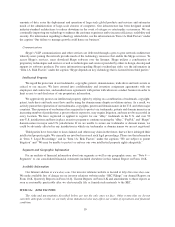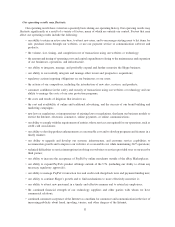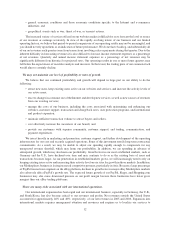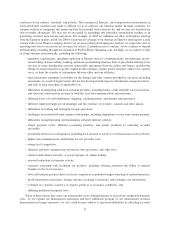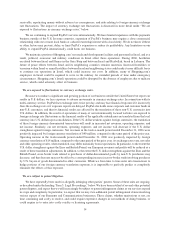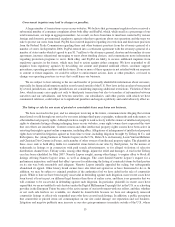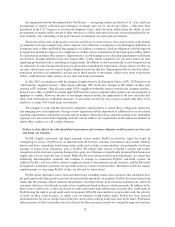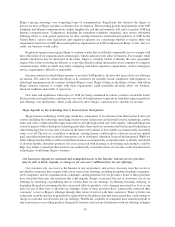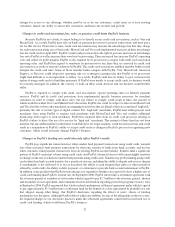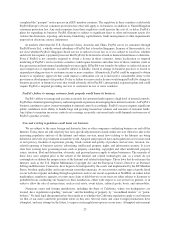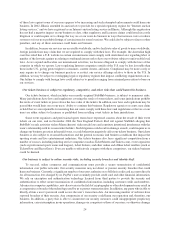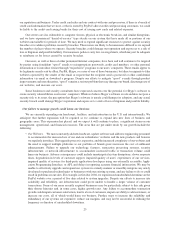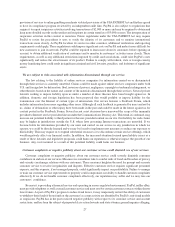eBay 2006 Annual Report Download - page 24
Download and view the complete annual report
Please find page 24 of the 2006 eBay annual report below. You can navigate through the pages in the report by either clicking on the pages listed below, or by using the keyword search tool below to find specific information within the annual report.Skype’s pricing advantage over competing forms of communication. Regulations that decrease the degree of
privacy for users of Skype’s products could also slow its adoption. The increasing growth and popularity of the VoIP
telephony and Internet communications market heighten the risk that governments will seek to regulate VoIP and
Internet communications. Competitors, including the incumbent telephone companies, may devote substantial
lobbying efforts to seek greater protection for their existing businesses and increased regulation of VoIP. In the
United States, various state legislatures and regulatory agencies are considering whether to impose their own
requirements and taxes on VoIP. Increased regulatory requirements on VoIP would increase Skype’s costs, and, as a
result, our business would suffer.
Regulatory agencies may require Skype to conform to rules that are difficult or impossible for it to comply with
due to the nature of its communications technologies, which could adversely affect its business. For example, while
suitable alternatives may be developed in the future, Skype is currently unable to identify the exact geographic
origin of the traffic traversing the Internet or to provide detailed calling information about computer-to-computer
communications, either of which may make complying with future regulatory requirements, such as emergency
service requirements, difficult or impossible.
In many countries in which Skype operates or provides VoIP products, the laws that may relate to its offerings
are unclear. We cannot be certain that Skype or its customers are currently in full compliance with regulatory or
other legal requirements in all countries in which Skype is used. Skype’s failure or the failure of those with whom
Skype transacts business to comply with these requirements could materially adversely affect our business,
financial condition and results of operations.
New rules and regulations with respect to VoIP are being considered in various countries around the world.
Such new rules and regulations could increase our costs of doing business or prevent us from delivering our products
and offerings over the Internet, which could adversely affect Skype’s customer base, and thus its revenue.
Skype depends on key technology that is licensed from third parties.
Skype licenses technology underlying certain key components of its software from third parties it does not
control, including the technology underlying its peer-to-peer architecture and firewall traversal technology, and the
audio and video compression/decompression used to provide high sound and video quality. Although Skype has
contracts in place with its third party technology providers, there can be no assurance that the licensed technology or
other technology that we may seek to license in the future will continue to be available on commercially reasonable
terms, or at all. The loss of, or inability to maintain, existing licenses could result in a decrease in service quality
until equivalent technology or suitable alternatives can be developed, identified, licensed and integrated. While we
believe Skype has the ability to either extend these licenses on commercially reasonable terms or identify and obtain
or develop suitable alternative products, the costs associated with licensing or developing such products could be
high. Any failure to maintain these licenses on commercially reasonable terms or to license or develop alternative
technologies would harm Skype’s business.
Our businesses depend on continued and unimpeded access to the Internet. Internet service providers
may be able to block, degrade, or charge us for our users’ additional fees for our offerings.
Our customers rely on access to the Internet to use our products and services. In many cases that access is
provided by companies that compete with at least some of our offerings, including incumbent telephone companies,
cable companies, mobile communications companies, and large Internet service providers. Some of these providers
have stated that they may take measures that could degrade, disrupt, or increase the cost of customers’ use of our
offerings by restricting or prohibiting the use of their lines for our offerings, by filtering, blocking, delaying, or
degrading the packets containing the data associated with our products, or by charging increased fees to us or our
users for use of their lines to provide our offerings. Some of these providers have contractually restricted their
customers’ access to Skype’s offerings through their terms of service with their customers. These activities are
technically feasible and may be permitted by applicable law. In addition, Internet service providers could attempt to
charge us each time our customers use our offerings. Worldwide, a number of companies have announced plans to
take such actions or are selling products designed to facilitate such actions. Interference with our offerings or higher
20


